COVID-19: In South Odisha, Home-Based Classes in the Hinterland help Tribal Children Cope
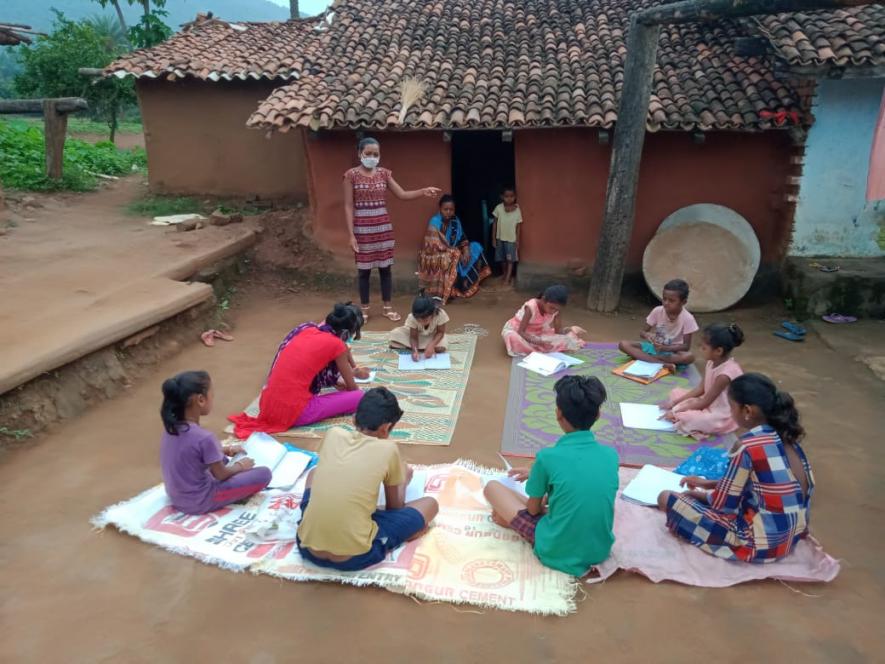
Village Volunteer taking home based classes during this pandemic
Twenty-three-year-old Krishna Vadaka was a farmer in his village Tankupadar – it falls under Kurli Panchayat of Lanjigarh block in Odisha’s Kalahandi district – prior to the lockdown. Today, the young graduate is known as a ‘Village Volunteer’ teacher. He spends two hours in the morning and in the evening teaching tribal children from his village. The children are also eager attend his classes as schools have been closed for a prolonged period to contain the spread of the novel coronavirus.
“These children cannot afford smartphones to attend online classes. I am happy that they are able to continue with their education even at home. During these hours the children from my village prefer to study than roam or play,” Vadaka said on the phone adding, that his method was not the old chalk and duster routine but one which allows for play. It has attracted many children, including 12-year-old Indubati Nanaka, a student of the fifth class in Tankupadar Primary School.

A child writing first letter of Odia script
Every day she carries some pebbles, flowers, leaves and twigs along with her books while attending home-based classes conducted in her village. The items she uses are TLM (teaching learning materials) to learn arithmetic and language from the village volunteer teacher. “I use these materials for learning addition and subtraction and find it more interesting than doing the same on a slate with chalk”, said Indubati.
Her parents, Utara and Kanchan Nanaka, are happy that their daughter is able to study and has been taking an interest in attending classes regularly. Ever since the coronavirus-induced nationwide lockdown, like other children in remote villages in Odisha, Indubati too was deprived of regular classes due to prolonged school closure. Her days were spent playing or helping out her mother in house-hold work. “We cannot buy a smart phone for our daughter and we are also not digitally literate enough to handle and explain the gadget to her. We were worried about the loss to her learning,” said Utara, her father.
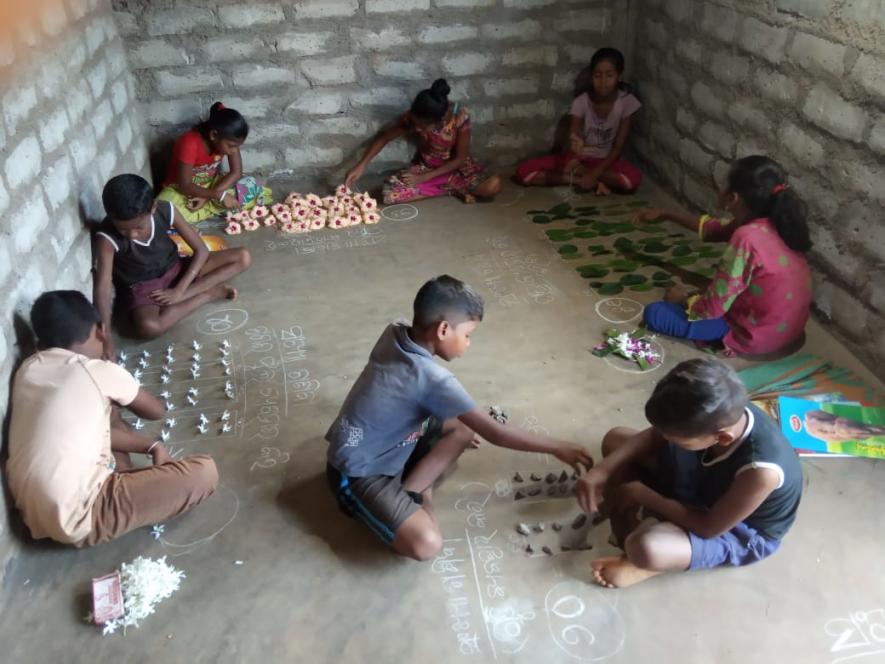
Children using TLM to learn arithmetic and language
About 39 kms away in Bissamcuttack block of Rayagada district, ten-year-old Sanatan Hikaka, preferred to help out his parents in farm-work during the lockdown. At Kuruli Panchayat, villagers were engaged in plucking pineapple and supplying it to vendors in April. As there was a need for two extra hands to make more money, many parents engaged their children in fruit-plucking during the lockdown. “We understood our children were facing learning losses. As the schools are closed, we thought of keeping them engaged in work rather than allow them to roam around in the village,” said Dasarath Hikaka, Sanatan’s father. In most of the remote villages of Odisha, especially in the districts of Kandhamal, Kalahandi and Rayagada, tribal children are dropping out of school due to the lack of internet connectivity, smartphones and digital illiteracy.
Reaching Out to Tribal Children
When the lockdown was imposed and migrants started returning to their villages, the regular sight in these interior pockets of Odisha were children playing with balls made out of socks, grazing goats, working in fields or fishing in the ponds. As the lockdown persisted, the OSEPA (Odisha School Education Programme Authority) launched online classes to reach out to students from all state-run schools; most of the children from these areas remained uncovered, however. Livolink Foundation, an associate of Tata Trusts working in the education sector in the southern districts of Odisha, began a home-based learning support program for tribal children. “We understood that prolonged school closure will increase learning losses. Online classes were not a possibility, given the digital divide in this part of the state. Thus, the whole idea was teaching students through locally available resources and TLMs and improve their learning ability in both arithmetic and language,” said Santosh Dash, program manager at Livolink Foundation. Over these seven months the programme has covered more than eight thousand students within the age bracket of three and fourteen years in 290 villages across three blocks.
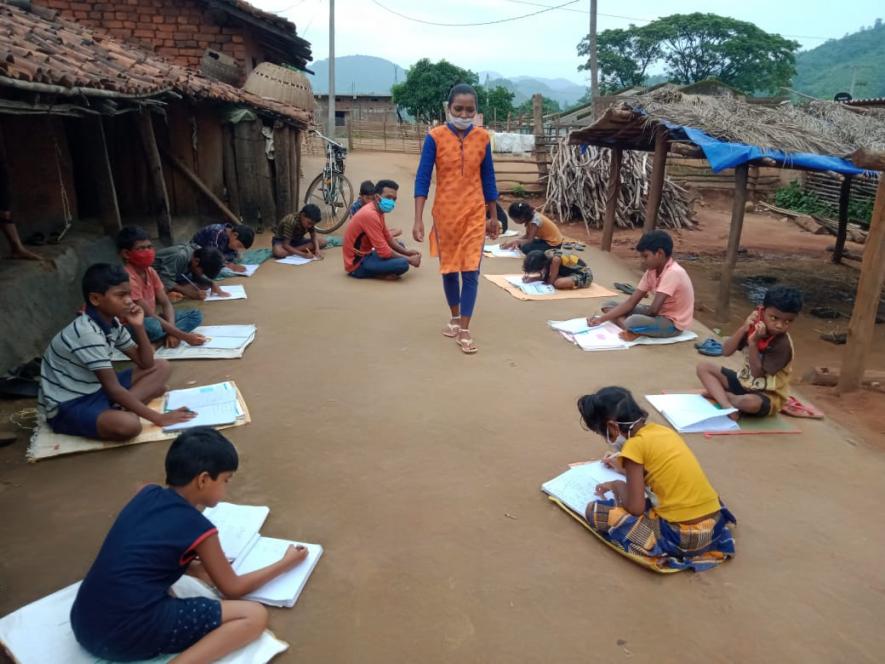
Village Volunteer conducting home-based classes in the village
Talking about the teaching process he said, “At the Panchyat level, School Improvement Facilitators were trained to support Village Volunteers to teach students using locally available resources and TLMs.” The objective of the programme is keeping children meaningfully engaged during COVID-19 and promote continuation with their learning while adhering to pandemic protocols.
“The tribal children connect themselves well with nature and their surroundings, so we decided to use all our local resources as TLMs to build a connection given their context and promote their skills in foundational literacy and numeracy aspects etc. It also helps small children to improve their gross motor and fine motor skills in this process,” he added. These activities are also shared with cluster level and block level education officials for necessary support in terms of text books and remedial materials available to children in village, since given COVID-19, children from these remote villages have no other means with which to study.
In the Hands of Villagers
Before conducting home-based classes, the team went door-to-door to convince parents to agree to send their children. The parents were initially reluctant but later agreed. A Covid Community Education Group, with Sarpanch, SMC members, ward member, Anganwadi worker and some educated persons of the village as members was formed in each village to select Village Volunteers and manage these home-based classes during pandemic. Krishna Vadaka was selected through this process.
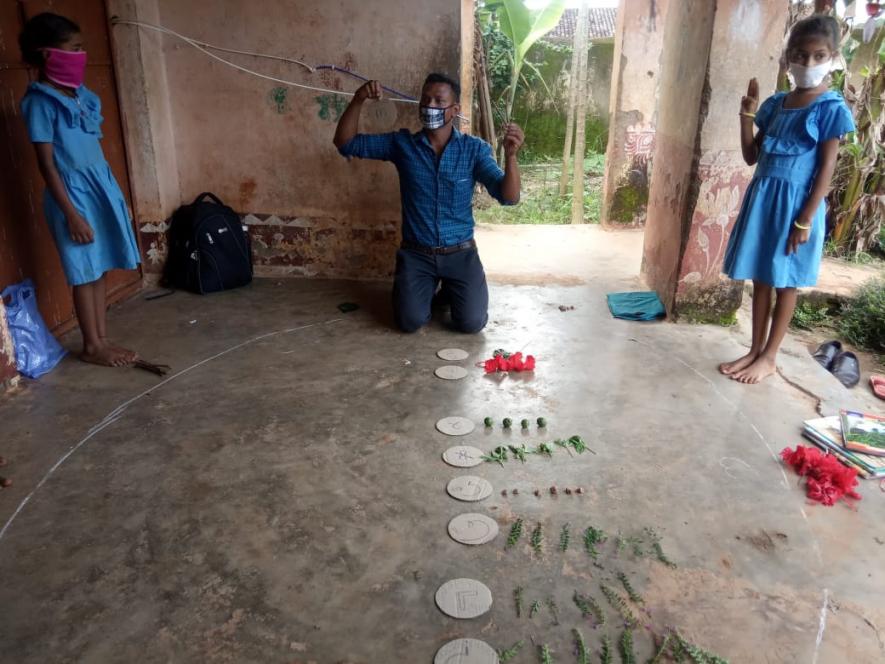
Village Volunteer conducting home-based classes in the village
“We found after closure of colleges most youth returned home and agreed to volunteer for teaching children in their villages. When we approached these youths, they readily agreed to our proposal. Even educated young women in many villages came forward to teach students as Village Volunteers,” explained Dash, adding the reason for preferring village youths was teaching students in their mother tongue.
The home-based classes are conducted at the childrens’ homes, verandahs (porch), community areas or under tree sheds, every morning between 8:00 am and 10 ten am and in the afternoon between 3 pm and 5 pm. In some villages, almost all the children are attending classes in batches while respecting social distancing norms. “The teaching process is not exam-oriented but rather fun and play based and by using TLMs we have in our village. We teach them what generates an interest in them,” said Jayanti Hikaka, another Village Volunteer teacher.
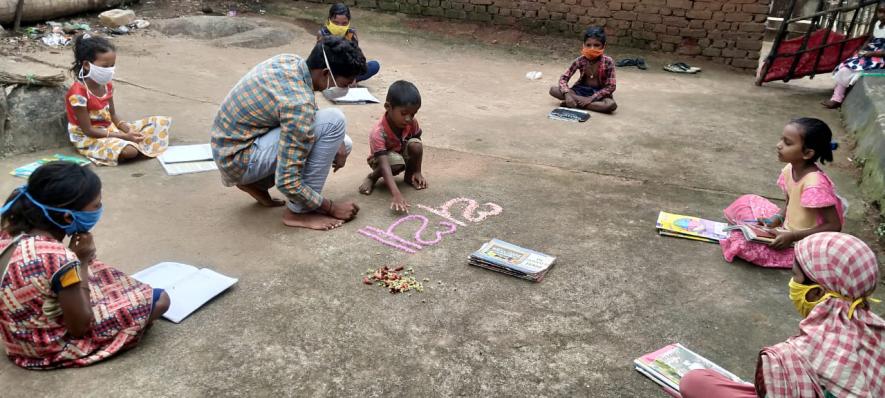
Village Volunteer conducting home-based classes in the village
As the classes are mostly out in the open, parents and villagers regularly come to see and monitor their children. They also convince other parents to send their children regularly. “In this situation when our children are unable to attend school, these home-based classes help them to keep in touch with studies. We are not allowing outsiders to enter our village, so the youth of our village is teaching these students. Many parents are sending their girls to join these classes rather than engaging them in house-hold chores,” said Mohini Mohan, Sarpanch of Tigidi Panchayat, Bissamcuttack. Some of the neighboring villages are interested in inviting them to conduct such classes in their villages.
Following COVID-19 Guidelines
The students begin their day by first washing their hands with soap, wear masks properly and then sitting on their mats while maintaining physical distance. In the first few classes the children were taught about the new virus and trained in how to protect themselves. This helped them to follow guidelines. The students who learned these practices have also taught their parents to change their behavior and adopt the practices while at home and in fields. Ten-year-old Shankar, a student in class five, said: “We don’t have a television or mobile phones at home which will help us learn practices to protect us from the coronavirus. After I joined the classes I learned and taught my parents to change their behaviour It is now a matter of habit in our family and even our neighbours are following this,” he said.

Children are standing in a queue to wash their hands
“In the interior pockets of the tribal villages, where children are facing a serious digital divide, these home-based classes are helping them to remain connected with their learning and schooling process, so that they can catch up well when the schools reopen. This will prevent children of dropping out of schools and help them cope up with the socio-psychological challenges that the COVID-19 pandemic has unleashed,” said Pradeepta Sundaray of Tata Trusts.
The author is an independent journalist. Views are personal.
Get the latest reports & analysis with people's perspective on Protests, movements & deep analytical videos, discussions of the current affairs in your Telegram app. Subscribe to NewsClick's Telegram channel & get Real-Time updates on stories, as they get published on our website.























